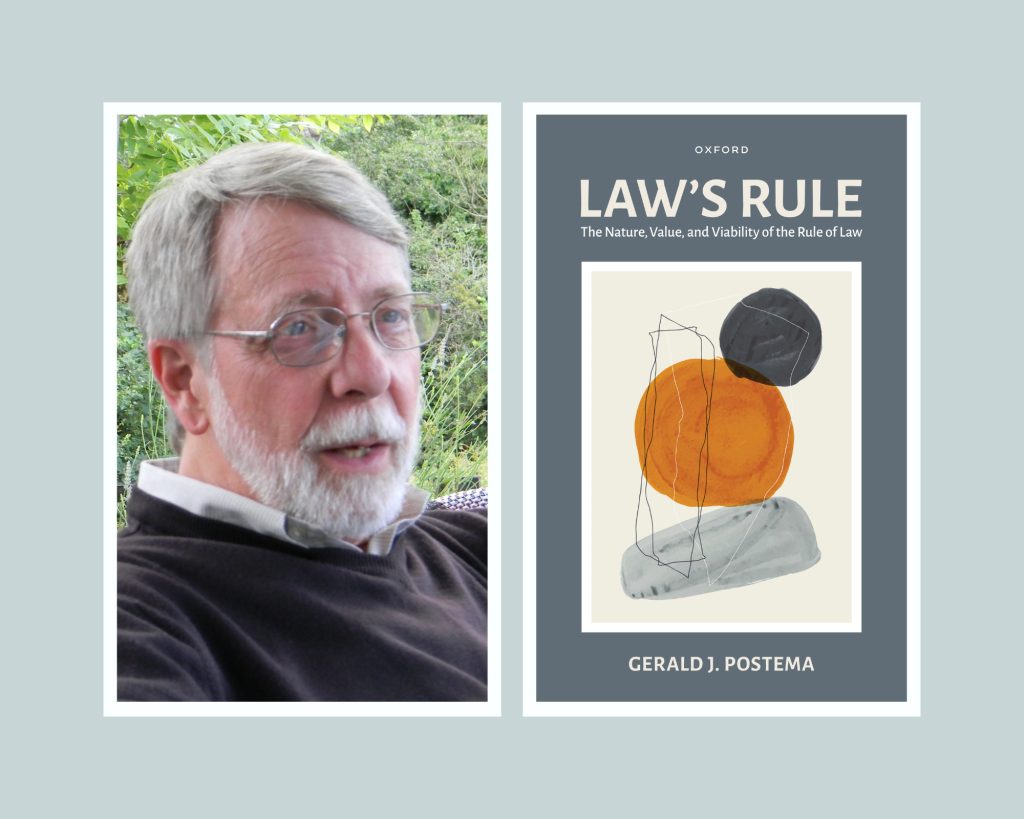
 Bookmark This is a feature that highlights new books by College of Arts and Sciences faculty and alumni, published the first week of each month. This month’s featured book is Law’s Rule: The Nature, Value, and Viability of the Rule of Law (Oxford University Press) by Gerald J. Postema. (The book is set to be published Nov. 15)
Bookmark This is a feature that highlights new books by College of Arts and Sciences faculty and alumni, published the first week of each month. This month’s featured book is Law’s Rule: The Nature, Value, and Viability of the Rule of Law (Oxford University Press) by Gerald J. Postema. (The book is set to be published Nov. 15)
Q: Can you give us a brief synopsis of your book?
A: The rule of law, once widely embraced and emulated, now faces serious threats to its viability. To get our bearings we must return to first principles. This book articulates and defends a comprehensive, coherent and compelling conception of the rule of law and defends it against serious challenges to its intelligibility, relevance and normative force. The rule of law’s ambition, it argues, is to provide protection and recourse against the arbitrary exercise of power using the distinctive tools of the law. Law provides a bulwark of protection, a bridle on the powerful and a bond holding together the political community. Two principles immediately follow from this core: sovereignty of law, demanding that those who exercise ruling power govern with law and that law governs them, and equality in the eyes of the law, demanding that law’s protection extend to all bound by it. Animating law’s rule, the ethos of fidelity commits all members of the political community, officials and lay members alike, to take responsibility for holding each other accountable under the law.
Part I of the book articulates this conception and locates its moral foundation in a commitment to common membership of each person in this community, recognizing their freedom, dignity and status as peers. Part II addresses serious challenges currently facing law’s rule: finding a place in the legal system for equity, mercy and effective responses to emergencies, taming the new leviathans of the digital world and extending law’s rule beyond national borders.
Q: How does this fit in with your research interests and passions?
A: Throughout my university career, I have taught about issues concerned with the intersection of morality and law — on the nature of law and legal reasoning, justice (national and international), equality, professional responsibility. Philosophy, I have long argued, has much to say about these issues and sometimes what it has to say is worth taking seriously, even by people outside the academy. I have written on these topics, and increasingly over the last decade and a half on the place of the rule of law ideally in this brace of issues and problems. Repeatedly I faced, and asked my students to face, questions like — how does law protect against the abuse of power? Why value law if it so often goes awry? What does it mean to insist that law rules? Why think that is a good thing? Can we secure democracy or human rights apart from law — apart from law’s ruling?
Q: What was the original idea that made you think: “There’s a book here?”
A: The poet Dante once wrote of justice that it is so lovely that it is loved even by its enemies. The same is true of the rule of law. Over the last decade or so, it became apparent to many that the rule of law was under serious attack in the United States and abroad. Yet, rule-of-law saboteurs publicly defend their efforts in its name. I came to see that the time had come to uncover its first principles, to lay out clearly and convincingly the fundamental ideal and the powerful reasons for taking it seriously. It also became clear that I must do this in work that is accessible to readers who are not skilled practitioners of legal philosophy.
Q: What surprised you when researching/writing this book?
A: When I retired from the University, I cleaned out my study in Caldwell Hall (home of the UNC philosophy department). I discarded most of my files, but I kept a few. Going through them later, I discovered, to my surprise, that I had pitched a Ph.D. dissertation on the topic of the rule of law. I must have set that project aside and forgotten about it, since I wrote my dissertation on an entirely different topic. But the seed was planted, and finally, nearly 50 years later, the idea sprouted and grew into a major book.
Another, quite different surprise, was the discovery that the core concerns of the rule of law extend well beyond worries about presidential overreach and politician’s abuse of the constitution to the potential for abuse of power in the private sphere, in the international sphere — and even in the vast domain of artificial intelligence and its deployment in contemporary cyberspace.
Q: Where’s your go-to writing spot, and how do you deal with writer’s block?
A: I write in my monk cells (home offices), emerging from time to time to refill my coffee cup. One of these cells is in the Triangle, another in the mountains of North Carolina. When I need inspiration or need to refocus my energies, I walk around the little mountain (Echo Mountain) where my hermitage is located. It never fails to energize me.
Gerald J. Postema is Boshamer Distinguished Professor of Philosophy Emeritus in UNC’s College of Arts and Sciences. He has published extensively in legal and political philosophy and ethics. He taught philosophy and law at UNC from 1980 to 2019.
Nominate a book we should feature by emailing college-news@unc.edu. Find previous “Bookmark This” features by searching the term on our website, and some books to your reading list by checking out our College magazine books page.
